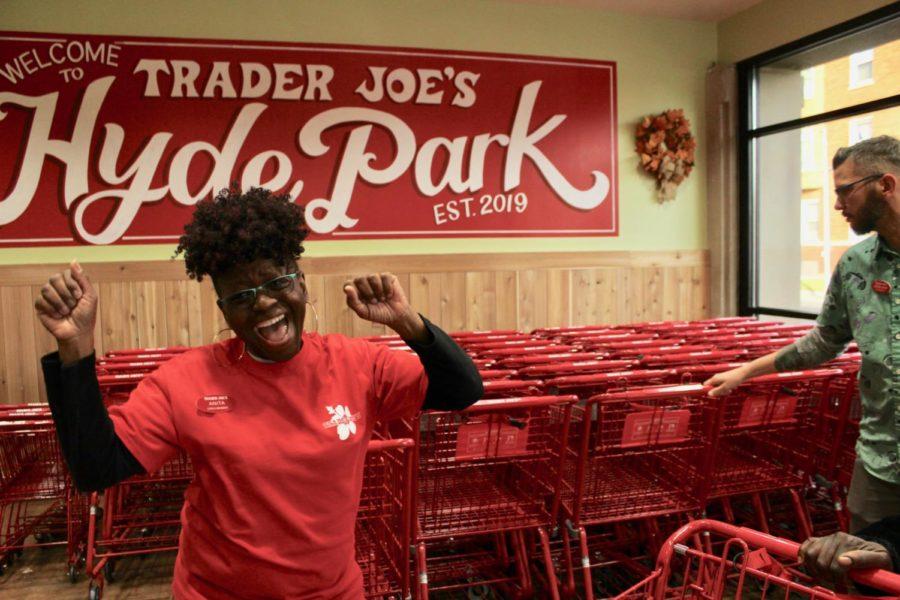Your support will ensure that we can continue producing powerful, honest, and accessible reporting that serves the University of Chicago and Hyde Park communities.
Reexamining “Food Deserts” in Chicago’s South Side
With the addition of grocery stores and supermarkets in Hyde Park and Woodlawn, new questions were raised about food access in the former food deserts.
February 19, 2022
With the addition of grocery stores and supermarkets over the past few years, residents have seen dramatic changes to the food landscape of Hyde Park, Woodlawn, and the South Side more broadly. Nevertheless, inequity in food access persists
A study published in July 2021 by Illinois Institute of Technology examined all 77 Chicago community areas and found that in regard to all categories of food outlets—supermarkets, grocery stores, convenience stores, and fast food restaurants—African American communities consistently suffer from below-average food access. Out of 57 communities with below-average access to supermarkets, 26 were African-American communities; similarly, 40 percent of the communities with below-average access to grocery stores were African-American communities.
In October 2019, Trader Joe’s opened a Hyde Park location, replacing grocery store Treasure Island, which had closed its doors a year prior. In addition, regional supermarket chain Jewel-Osco opened its Woodlawn location in March 2019 of that same year after more than two years of development. The Woodlawn neighborhood had previously been without a full-service grocer store for over 40 years since the closure of Hillman’s.
Also in 2019, a Shop & Save opened in the South Shore neighborhood. Like Woodlawn, South Shore had been without a full-service grocery store for six years after the closing of Dominick’s.
However, in March 2020, the Bronzeville Save A Lot closed permanently, and in February 2019, Target closed two of its South Side stores.
The addition of big-name food outlets has been part of a concerted effort to redevelop the South Side. Proponents of the effort have advocated the addition of grocery stores. In a February 2019 interview with The Maroon, real estate developer Leon Walker, who is a managing partner at DL3 Realty, said that the opening of the Woodlawn Jewel-Osco was designed to serve three key functions: creating jobs, encouraging additional investment in the area, and reducing the need for government and charity support.
The University of Chicago has also been party to these efforts in the South Side. The University owns the Hyde Park Shopping Center on South Lake Park Avenue, where Trader Joe’s is located, and acquired the land occupied by Jewel-Osco at East 61st Street and Cottage Grove Avenue for almost $20 million in 2020.
While this development has aided the opening of several new food stores on the South Side, there are still several different approaches on how to combat inequitable food access.
Natalja Czarnecki, a postdoctoral teaching fellow in the Division of the Social Sciences, studies food politics with an emphasis on food safety. She highlights the implicit cultural attitudes toward food that affect policy decisions, saying that very often, food access is framed in terms of consumer choice. “It’s the consumer who bears the burden of making the right choice constantly,” Czarnecki said.
Czarnecki suggests that the concept of a food desert—a term commonly used to describe communities that have limited access to affordable and nutritious food—is worth interrogating. “[It] decontextualizes the entire food system and the entire political economy of food that itself creates these deserts in the first place,” she said.
Czarnecki added that the treatment of food “primarily as a clump of nutritional supplement” leads to a focus on informational messaging rather than socially oriented approaches. “The logic there is that if they only knew that Trader Joe’s or Whole Foods has organic food or the farmer’s market has better food, then they would eat better.”
As a result, community organizations like food shelters and gardens are consistently left out of data and discussions
concerning food access. While traditional grocery stores tend to be the first out- lets that spring to mind in discussions of
food access, community organizations in Chicago also work to advance equitable and sustainable food access.
Hyde Park residents may be especially familiar with The Love Fridge, a mutual aid group that stocks community fridges across the city. Other notable Chicago food-access organizations include the Little Village Environmental Justice Organization, Sweet Water Foundation, and Grow Greater Englewood.
The Urban Growers Collective (UGC), which was founded in 2017, works to “demonstrate the development of community-based food systems and to support communities in developing systems of their own where food is grown, prepared, and distributed within the community itself.”
In addition to other initiatives like job training programs and a youth corps, UGC’s Production Manager Malcolm Evans highlighted the organization’s mobile produce market. “One of our big initiatives is our Fresh Moves Mobile Market program. So we have a big bus that we [use to] go around to different neighborhoods that are short on healthy food or affordable food, and we bring that food to them at a low cost.”
Evans noted that in the face of the COVID-19 pandemic, community gardens helped to fill the gap left by supply chain issues. “We were able to get millions of pounds of food out in the first year of the pandemic. So the change I saw was that people were trying to get healthy food, get more vegetables, because grocery stores were running out.”
Evans concluded by noting the importance of community-based initiatives. “You want to keep that connection with folks. You want to be able to move with them, work with them. You don’t want them to come around [once] and leave. That’s not sustainable.”
